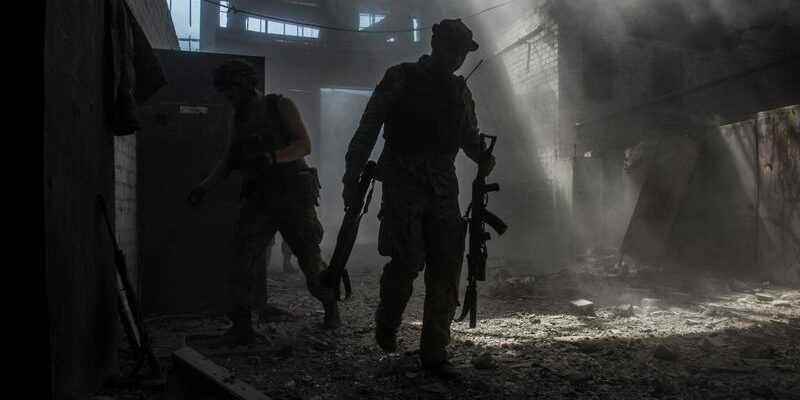Ukrainian officials have said there is little left to defend in the bombed eastern city, where hundreds of civilians remain trapped in a chemical plant.
Friday’s withdrawal order came four months to the day after Russian President Vladimir Putin sent tens of thousands of troops across the border, sparking a conflict that has left thousands dead, uprooted millions. of people and reduced entire cities to rubble.
Luhansk region governor Serhiy Gaidai said Sievierodonetsk troops had already been ordered to move to new positions.
“Staying in crumbling positions for many months just for the sake of staying there doesn’t make sense,” Gaidais told Ukrainian television.
The withdrawal from Sievierodonetsk would mark the biggest setback for Ukraine since losing the southern port of Mariupol in May.
The latest Russian advances appear to bring the Kremlin closer to taking full control of Luhansk, one of Moscow’s declared war aims, and setting the stage for Sievierodonetsk’s twin city of Lysychansk to become the next major focus of the fighting.
Vitaly Kiselev, an official of the Interior Ministry of the Luhansk People’s Republic (recognized only by Russia), told Russian news agency TASS that it would take another week and a half to gain full control of Lysychansk. .
Russia invaded Ukraine on February 24, but gave up an early advance on the capital kyiv in the face of fierce resistance backed by Western armies.
Since then, Moscow and its proxies have focused on the south and Donbas, an eastern territory made up of Luhansk and its neighbor Donetsk, deploying overwhelming artillery in some of the fiercest ground fighting in Europe since World War II.
On Friday, Ukraine pressed again for more weapons. Its General-in-Chief, Valeriy Zaluzhniy, told his American counterpart in a telephone call that kyiv needed “fire parity” with Moscow to stabilize the Luhansk situation.
ORDERLY RETREATS
South of Sievierodonetsk, Ukrainian soldiers also withdrew from the towns of Hirske and Zolote in the face of overwhelming Russian forces, said Oleksiy Arestovych, an adviser to Ukrainian President Volodymyr Zelenskiy.
Mr Arestovych said the orderly retreat from the cities was a good thing as it broke with a Soviet and post-Soviet military tradition of never retreating under any circumstances.
He said the Ukrainian military had learned the hard lesson of trying to defend their positions at all costs during battles with pro-Russian forces in 2014.
“Now for the first time we have a history of our boys retreating in an orderly fashion,” he said in a video message online.
Russian troops entered Hirske and fully occupied the surrounding district on Friday, city leader Oleksiy Babchenko said.
“A red flag is flying above the municipal administration (Hirske),” a spokesman for the regional administration told Reuters by telephone.
The Ukrainian Foreign Minister downplayed the importance of the possible loss of new territories in the Donbas.
“Putin wanted to occupy Donbas by May 9. We are (there) on June 24 and we are still fighting. Backing down a few battles does not mean losing the war at all,” Dmytro Kuleba said in an interview with the Italian newspaper Corriere della Sera.
The General Staff of the Armed Forces of Ukraine said its troops had achieved some success in the southern Kherson region, forcing the Russians to retreat from their defensive positions near the village of Olhine, the latest of several counterattacks Ukrainians.
Ukrainian media showed footage of a burning school damaged by Russian shelling in Avdiivka, a town in the Donetsk region just inside Ukrainian-controlled territory. According to reports, the school was used as a first aid center and the attack destroyed medicines and other supplies.
Reuters could not confirm details of the fighting.
Russia claims to have sent troops to Ukraine to degrade its southern neighbor’s military capabilities and eliminate people it calls dangerous nationalists.
Ukraine, which says Russia has embarked on an imperial-style land race, won fresh backing from the West this week.
The war had a huge impact on the global economy and on European security arrangements, driving up the prices of gas, oil and foodstuffs, pushing the EU to reduce its heavy dependence on Russian energy and encouraging Finland and Sweden to apply for NATO membership.
The West has imposed an unprecedented set of sanctions on Russia, its major businesses and its economic and political elite in response to Moscow’s invasion of Ukraine.
These measures have triggered an exodus of foreign companies, raised the prospect of Russia defaulting on its sovereign debt and look set to trigger a deep economic contraction.
In a major sign of support, European Union leaders this week endorsed Ukraine’s formal bid to join the bloc – a move Russia said on Friday amounted to the EU “enslaving” the neighboring countries.
